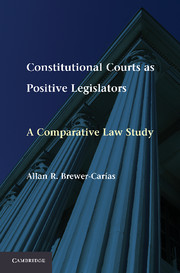Book contents
- Frontmatter
- Contents
- AUTHOR'S NOTE
- PART ONE CONSTITUTIONAL COURTS AS POSITIVE LEGISLATORS IN COMPARATIVE LAW
- CHAPTER 1 JUDICIAL REVIEW OF LEGISLATION AND THE LEGISLATOR
- CHAPTER 2 CONSTITUTIONAL COURTS' INTERFERENCE WITH THE CONSTITUENT POWER
- CHAPTER 3 CONSTITUTIONAL COURTS' INTERFERENCE WITH THE LEGISLATOR ON EXISTING LEGISLATION
- CHAPTER 4 CONSTITUTIONAL COURTS' INTERFERENCE WITH THE LEGISLATOR REGARDING LEGISLATIVE OMISSIONS
- CHAPTER 5 CONSTITUTIONAL COURTS AS LEGISLATORS ON MATTERS OF JUDICIAL REVIEW
- PART TWO NATIONAL REPORTS
- ARGENTINA
- AUSTRALIA
- AUSTRIA
- BELGIUM
- BRAZIL
- CANADA
- COLOMBIA
- COLOMBIA
- COSTA RICA
- CROATIA
- CZECH REPUBLIC
- FRANCE
- GERMANY
- BELGIUM, FRANCE, GERMANY
- GREECE
- HUNGARY
- INDIA
- ITALY
- MEXICO
- NETHERLANDS
- NORWAY
- POLAND
- PORTUGAL
- SERBIA
- SLOVAK REPUBLIC
- SWITZERLAND
- UNITED KINGDOM
- UNITED STATES OF AMERICA
- VENEZUELA
- PART THREE SYNTHESIS REPORT: CONSTITUTIONAL COURTS AS POSITIVE LEGISLATORS IN COMPARATIVE LAW
- APPENDIX
- INDEX
NETHERLANDS
The Dutch Supreme Court: A Reluctant Positive Legislator?
Published online by Cambridge University Press: 04 August 2017
- Frontmatter
- Contents
- AUTHOR'S NOTE
- PART ONE CONSTITUTIONAL COURTS AS POSITIVE LEGISLATORS IN COMPARATIVE LAW
- CHAPTER 1 JUDICIAL REVIEW OF LEGISLATION AND THE LEGISLATOR
- CHAPTER 2 CONSTITUTIONAL COURTS' INTERFERENCE WITH THE CONSTITUENT POWER
- CHAPTER 3 CONSTITUTIONAL COURTS' INTERFERENCE WITH THE LEGISLATOR ON EXISTING LEGISLATION
- CHAPTER 4 CONSTITUTIONAL COURTS' INTERFERENCE WITH THE LEGISLATOR REGARDING LEGISLATIVE OMISSIONS
- CHAPTER 5 CONSTITUTIONAL COURTS AS LEGISLATORS ON MATTERS OF JUDICIAL REVIEW
- PART TWO NATIONAL REPORTS
- ARGENTINA
- AUSTRALIA
- AUSTRIA
- BELGIUM
- BRAZIL
- CANADA
- COLOMBIA
- COLOMBIA
- COSTA RICA
- CROATIA
- CZECH REPUBLIC
- FRANCE
- GERMANY
- BELGIUM, FRANCE, GERMANY
- GREECE
- HUNGARY
- INDIA
- ITALY
- MEXICO
- NETHERLANDS
- NORWAY
- POLAND
- PORTUGAL
- SERBIA
- SLOVAK REPUBLIC
- SWITZERLAND
- UNITED KINGDOM
- UNITED STATES OF AMERICA
- VENEZUELA
- PART THREE SYNTHESIS REPORT: CONSTITUTIONAL COURTS AS POSITIVE LEGISLATORS IN COMPARATIVE LAW
- APPENDIX
- INDEX
Summary
INTRODUCTION
With respect to constitutional fundamental rights review by the judiciary, the Netherlands has always been a bit of a stranger in Europe. Comparatists usually describe the way judicial review of statutes in Europe is shaped as different from the American system, where the Supreme Court has basically empowered itself to review the constitutionality of statutory laws. The authority to strike down legislation in the New World is therefore exercised by the judiciary at large, and it is the highest appellate court that ultimately decides on the matter. By contrast, the European tradition is closely connected to the existence of Kelsenian constitutional courts specialized in reviewing the constitutionality of statutes and executive action. Such courts notably exist in, for instance, Germany, Italy, Austria, Spain, and Belgium but also in the relatively younger liberal democracies like Poland and the Czech Republic. Constitutional courts almost by definition engage in a critical dialogue with the national legislature. When Hans Kelsen famously described constitutional courts as negative legislators, he was referring to their power to annul acts of the legislature.
It is at this point that the Dutch differ from most of their European neighbors. Their legal system does not involve concentrated review by a specialized constitutional court. This is largely because judicial review of primary legislation is traditionally prohibited pursuant to Article 120 of the Dutch Constitution. It is clear from the outset that this ban on judicial review reduces the need for a specialized court.
- Type
- Chapter
- Information
- Constitutional Courts as Positive LegislatorsA Comparative Law Study, pp. 645 - 692Publisher: Cambridge University PressPrint publication year: 2011
- 4
- Cited by

